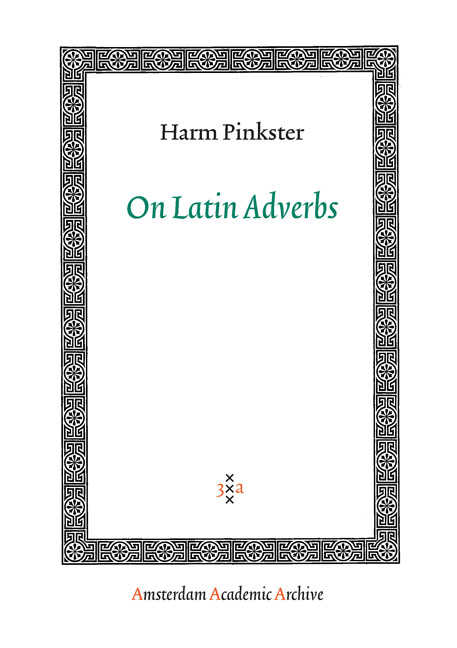Book contents
- Frontmatter
- Preface to this Edition
- Preface
- Contents
- Introduction
- 1 General Problems of Studying a Dead Language
- 2 Problems of Classification
- 3 Adverbs in Roman Grammatical Theory
- 4 The Adverb in Latin Linguistics
- 5 Adverbs as Derived Forms
- 6 Syntactic Problems
- 7 Subclassification of Adverbs
- 8 Adverbs and other Invariables
- 9 The Relationship Between Adverbs and Prepositions
- 10 Adverbs and Connectors
- 11 Adverbs and Subordinators
- Bibliography
- Indices
- Index Auctorum
- Titles Published in the Aaa Series
2 - Problems of Classification
Published online by Cambridge University Press: 24 January 2021
- Frontmatter
- Preface to this Edition
- Preface
- Contents
- Introduction
- 1 General Problems of Studying a Dead Language
- 2 Problems of Classification
- 3 Adverbs in Roman Grammatical Theory
- 4 The Adverb in Latin Linguistics
- 5 Adverbs as Derived Forms
- 6 Syntactic Problems
- 7 Subclassification of Adverbs
- 8 Adverbs and other Invariables
- 9 The Relationship Between Adverbs and Prepositions
- 10 Adverbs and Connectors
- 11 Adverbs and Subordinators
- Bibliography
- Indices
- Index Auctorum
- Titles Published in the Aaa Series
Summary
In this chapter I will discuss some general problems of classification, viz. the purposes ‘of classification, the types of criteria on which a classification can be based, the relation between these types and, finally, the relative importance of the criteria and the number of criteria required.
Purposes ofclassification
Linguistic items can be grouped into classes on account of certain characteristics they have in common. Word classification, such as the classification of adverbs, is a specific instance of this general problem. The purposes of such a classification are to obtain a higher degree of generalization in the description of the specific language the linguist is working on, to make it more adequate since, while classifying, the linguist is forced to state explicitly which items are similar, and in what respects, which items are different, and what is the relation between the various classes to which the items are assigned. The description becomes simpler since identical or similar phenomena can be described together in one statement (Crystal 1967: 25-7; Van Wijk 1967: 235; Schopf 1963: 63). Classification should, of course, be based on a careful analysis of an adequate sample of material (cf. 1.1.).
Once the linguist has reached a satisfactory classification and has thereby left the stage of discovery he may incorporate the classes in the grammar. The way in which this incorporation is effected will be determined by the type of grammar the linguist has in mind. Traditionally the incorporation took the form of a more or less explicit defmition, like Priscian's adverb definition: ‘the adverb is an invariable part of speech that modifies a verb’ (cf. ch. 3). One may also indicate the membership of classes in rewriting rules, as was usual in earlier versions of transformational generative grammar (Bach 1964: 27-9). For example,
Adverb → nunc ('now’), heri ('yesterday’), etc.
The (sub)classes involved may either be closed and then we can enumerate their members, or open, and then we can only characterize them in some way or other. For example, local adverbs (hic ('here’), etc.) could be enumerated not only because there are not many of them, but also because in Latin there seems to be no way of adding items to this subclass. On the other hand, the subclass of so-called regular adverbs like misere ('miserably’), feliciter ('happily’) is open, since items may be added any time: the formation of these adverbs is productive.
Information
- Type
- Chapter
- Information
- On Latin Adverbs , pp. 17 - 34Publisher: Amsterdam University PressPrint publication year: 2005
